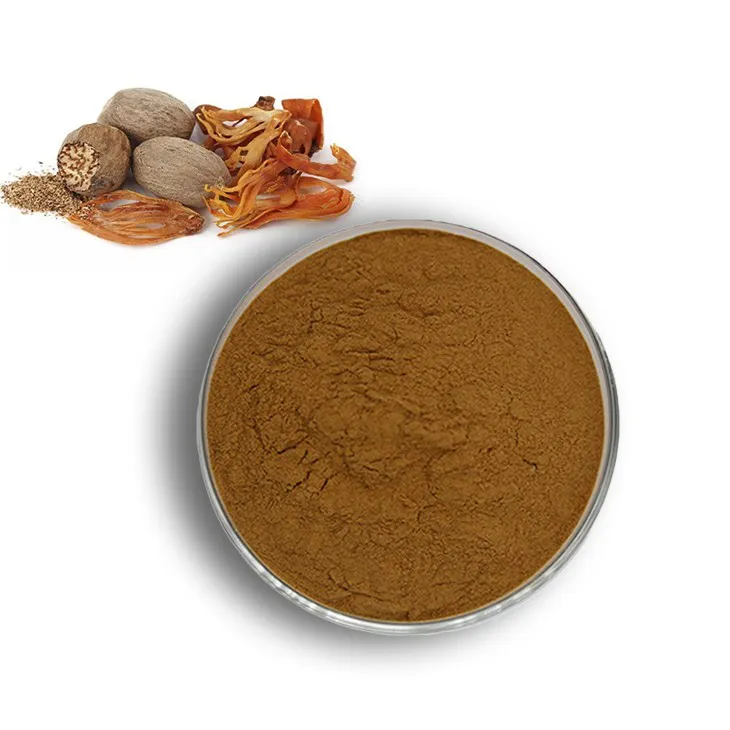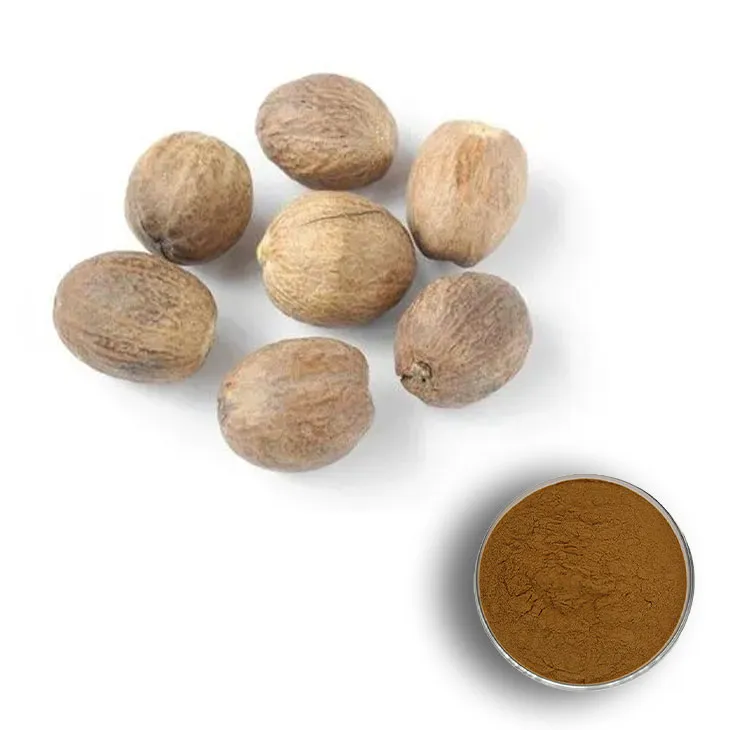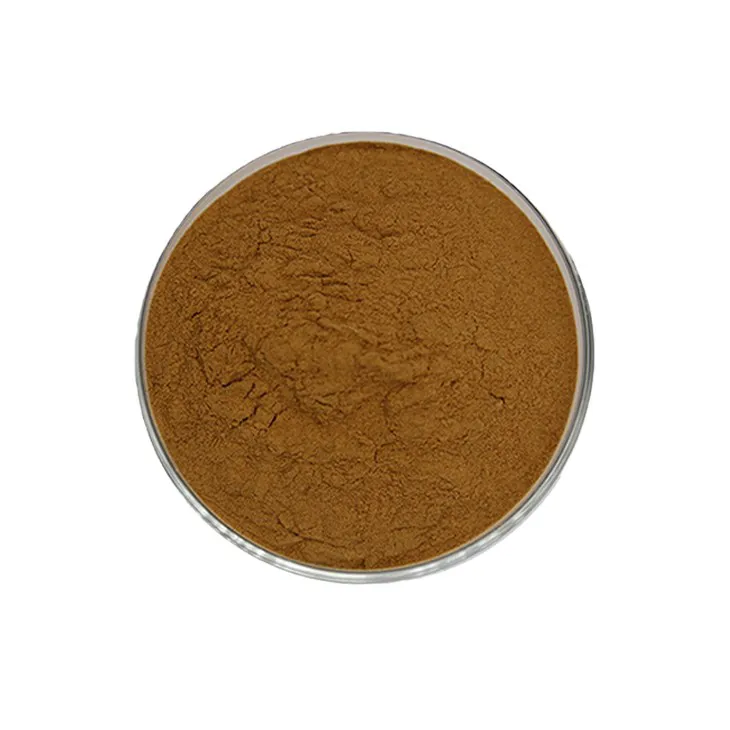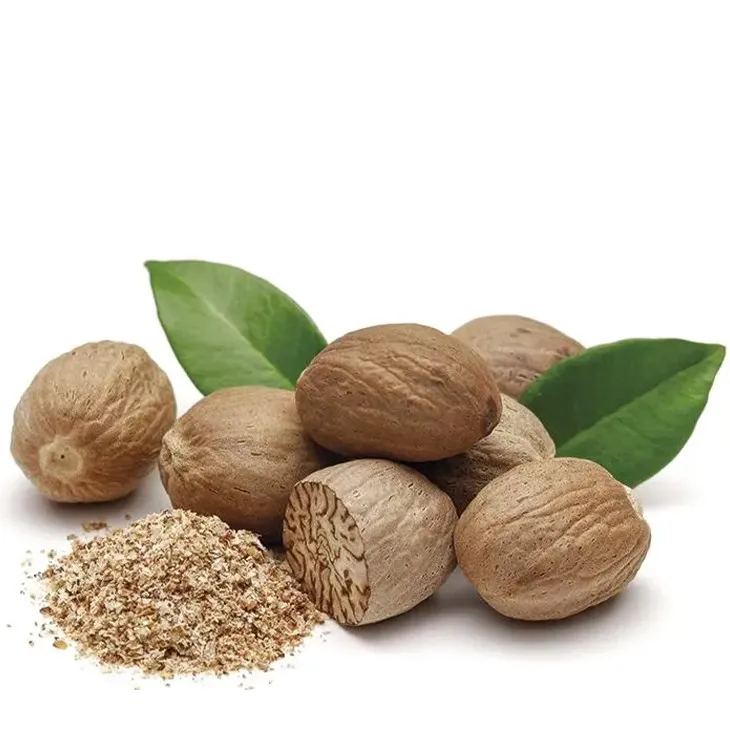- 0086-571-85302990
- sales@greenskybio.com
The Best Herb for Treating Anxiety and Insomnia: Nutmeg Extract
2024-11-12

1. Introduction
In modern society, anxiety and insomnia have become two of the most prevalent health issues. People are constantly exposed to various stressors such as work pressure, financial problems, and relationship difficulties, which often lead to anxiety. And this anxiety, in turn, can disrupt the normal sleep pattern, causing insomnia. While there are numerous pharmaceutical drugs available for treating these conditions, many of them come with potential side effects. In recent years, there has been a growing interest in natural remedies, and Nutmeg Extract has emerged as a potential solution for anxiety and insomnia.

2. Nutmeg and Its Bioactive Compounds
2.1 Nutmeg
Nutmeg is a spice that is obtained from the seed of the Myristica fragrans tree. It has been used for centuries in cooking and traditional medicine in different parts of the world. The nutmeg seed contains various components, including essential oils, fixed oils, and phenolic compounds.2.2 Bioactive Compounds in Nutmeg Extract
- Myristicin: This is one of the major bioactive compounds in nutmeg. It has been shown to have antioxidant, anti - inflammatory, and neuroprotective properties. Myristicin may play a role in modulating the neurotransmitter systems in the brain, which are involved in regulating mood and sleep.
- Elemicin: Another important compound, elemicin also has antioxidant and anti - inflammatory effects. It may contribute to the overall calming effect of Nutmeg Extract on the nervous system.
- Safrole: Although present in relatively small amounts, safrole is also a component of nutmeg. However, it should be noted that in large amounts, safrole can be toxic, but the levels found in nutmeg are within a safe range when used appropriately.

3. Scientific Mechanisms behind the Efficacy
3.1 Effects on the Nervous System
- Neurotransmitter Modulation: Nutmeg extract may influence neurotransmitters such as serotonin and gamma - aminobutyric acid (GABA). Serotonin is known as the "feel - good" neurotransmitter, and its imbalance can lead to anxiety and mood disorders. By potentially increasing serotonin levels, nutmeg extract can help to improve mood and reduce anxiety. GABA, on the other hand, is an inhibitory neurotransmitter that helps to calm the nervous system. Nutmeg extract may enhance the activity of GABA receptors, promoting relaxation.
- Stress Response Reduction: Chronic stress can disrupt the normal functioning of the hypothalamic - pituitary - adrenal (HPA) axis, leading to increased levels of stress hormones such as cortisol. Nutmeg extract has been shown to have an effect on reducing the overactivity of the HPA axis, thereby decreasing stress hormone levels and helping the body to better cope with stress.
3.2 Impact on Sleep Quality
- Relaxation Induction: As mentioned above, the calming effect of nutmeg extract on the nervous system can help the body to relax. This state of relaxation is conducive to falling asleep more easily. For example, by reducing muscle tension and mental arousal, it prepares the body for sleep.
- Regulation of Sleep - Wake Cycle: Nutmeg extract may also interact with the body's internal clock, or circadian rhythm. It can help to regulate the secretion of melatonin, a hormone that plays a crucial role in the sleep - wake cycle. By promoting the proper secretion of melatonin, nutmeg extract can improve the quality of sleep and help to correct sleep disorders.

4. Historical Use in Traditional Medicine
4.1 Ayurvedic Medicine
In Ayurvedic medicine, which has a long history in India, nutmeg has been used for various medicinal purposes. It has been considered a remedy for digestive problems, as well as for mental disorders. Ayurvedic practitioners believe that nutmeg can balance the body's "doshas" (energies) and promote overall well - being. In the context of treating anxiety and insomnia, nutmeg was often used in the form of herbal concoctions or added to food.4.2 Traditional Chinese Medicine
In Traditional Chinese Medicine (TCM), nutmeg has also been used for centuries. TCM classifies nutmeg as having warming and astringent properties. It has been used to treat conditions such as diarrhea, abdominal pain, and also some disorders related to the "Shen" (mind). Although not as commonly used specifically for anxiety and insomnia as in Ayurvedic medicine, nutmeg was still part of the herbal medicine repertoire in TCM and was thought to have a calming effect on the mind and spirit.
5. Proper Usage Methods
5.1 Dietary Incorporation
One of the simplest ways to use nutmeg is to incorporate it into the diet. Nutmeg can be added to various foods and beverages, such as warm milk, oatmeal, or baked goods. For example, adding a small amount (about 1/8 to 1/4 teaspoon) of ground nutmeg to a glass of warm milk before bedtime can be a natural way to promote relaxation and sleep. However, it should be noted that excessive consumption of nutmeg in the diet can cause some adverse effects, so moderation is key.5.2 Nutmeg Extract Supplements
- Dosage: When using nutmeg extract supplements, it is important to follow the recommended dosage. Typically, a low - dose supplement (ranging from 50 - 200 mg per day) may be sufficient for the desired effects. However, this can vary depending on individual factors such as age, weight, and the severity of the condition.
- Quality and Source: Ensure that the nutmeg extract supplement is of high quality. Look for products that are sourced from reliable suppliers and are subject to quality control measures. It is also advisable to choose supplements that are standardized to contain a specific amount of the active compounds.
5.3 Precautions
- Toxicity Concerns: As mentioned earlier, although the levels of potentially toxic compounds like safrole in nutmeg are generally safe when used in moderation, excessive intake can lead to toxicity. Symptoms of nutmeg toxicity can include nausea, vomiting, dizziness, and in severe cases, hallucinations. Therefore, it is crucial to avoid overconsumption.
- Interactions with Medications: Nutmeg extract may interact with certain medications. For example, it may potentiate the effects of sedatives or anti - anxiety drugs. If you are taking any medications, it is essential to consult your doctor before using nutmeg extract to avoid potential adverse interactions.
6. Research and Future Perspectives
While there is some evidence suggesting the efficacy of nutmeg extract in treating anxiety and insomnia, more research is needed.
6.1 Clinical Trials
- Large - scale, well - designed clinical trials are required to further confirm the effectiveness of nutmeg extract. These trials should include a diverse population with different levels of anxiety and insomnia, and should compare the effects of nutmeg extract with placebo and existing pharmaceutical treatments.
- Long - term studies are also necessary to assess the safety of nutmeg extract when used over an extended period. This is important as some natural remedies may have cumulative effects or potential long - term risks that are not immediately apparent.
6.2 Mechanistic Studies
- Further research is needed to fully understand the underlying mechanisms by which nutmeg extract exerts its effects on the nervous system and sleep. This includes in - depth studies on the interactions between nutmeg extract and neurotransmitter systems, as well as its impact on gene expression and cellular signaling pathways.
- Studies on the bioavailability of the bioactive compounds in nutmeg extract are also important. Understanding how these compounds are absorbed, distributed, metabolized, and excreted in the body can help to optimize the formulation and dosage of nutmeg - based products.
7. Conclusion
Nutmeg extract shows promise as a natural remedy for anxiety and insomnia. Its rich array of bioactive compounds and historical use in traditional medicine support its potential in this regard. However, it is important to use it properly and with caution, taking into account potential toxicity and interactions with medications. With further research, nutmeg extract may become an important addition to the arsenal of treatments for anxiety and insomnia, providing a more natural alternative for those seeking relief from these common and often debilitating conditions.
FAQ:
What are the bioactive compounds in nutmeg extract?
Some of the bioactive compounds in nutmeg extract include myristicin, elemicin, and safrole. These compounds are believed to contribute to its effects on the nervous system and its potential for treating anxiety and insomnia.
How does nutmeg extract calm the nervous system?
It is thought that the bioactive compounds in nutmeg extract interact with neurotransmitter receptors in the nervous system. For example, they may modulate the activity of gamma - aminobutyric acid (GABA) receptors, which play a key role in reducing neuronal excitability and promoting relaxation.
What is the historical use of nutmeg in traditional medicine for anxiety and insomnia?
In traditional medicine, nutmeg has been used for centuries to treat various ailments including anxiety and sleep disorders. In Ayurvedic medicine, for instance, nutmeg has been used as a natural remedy for promoting calmness and improving sleep. It was often prepared in the form of powders, tinctures, or added to herbal mixtures.
How should nutmeg extract be properly used for treating anxiety and insomnia?
The proper usage of nutmeg extract can vary. It can be taken in the form of supplements, but it is important to follow the recommended dosage instructions on the product label. Generally, it is not advisable to consume large amounts of nutmeg or its extract directly as it may have potential side effects. It is also best to consult a healthcare provider before starting any new treatment with nutmeg extract.
Are there any side effects of using nutmeg extract?
Yes, there can be side effects. In excessive amounts, nutmeg or its extract can cause symptoms such as nausea, dizziness, dry mouth, and in very high doses, it may even be toxic. That's why it is crucial to use it within the recommended limits and under proper medical guidance.
Related literature
- The Efficacy of Nutmeg Extract in Alleviating Anxiety: A Comprehensive Review"
- "Nutmeg Extract and Sleep Quality: Scientific Insights"
- "Traditional Uses of Nutmeg in Medicine and Their Modern Significance"
- ▶ Hesperidin
- ▶ citrus bioflavonoids
- ▶ plant extract
- ▶ lycopene
- ▶ Diosmin
- ▶ Grape seed extract
- ▶ Sea buckthorn Juice Powder
- ▶ Beetroot powder
- ▶ Hops Extract
- ▶ Artichoke Extract
- ▶ Reishi mushroom extract
- ▶ Astaxanthin
- ▶ Green Tea Extract
- ▶ Curcumin Extract
- ▶ Horse Chestnut Extract
- ▶ Other Problems
- ▶ Boswellia Serrata Extract
- ▶ Resveratrol Extract
- ▶ Marigold Extract
- ▶ Grape Leaf Extract
- ▶ blog3
-
High purity olive leaf extract
2024-11-12
-
Lavender oil extraction method
2024-11-12
-
100% organic virgin sea buckthorn fruit oil
2024-11-12
-
Lotus leaf extract powder factory in China
2024-11-12
-
China aged garlic extract supplier
2024-11-12
-
Deer antler extract powder manufacturer
2024-11-12
-
Saw palmetto extract vs whole herb
2024-11-12
-
Gynostemma pentaphyllum extract
2024-11-12
-
Beta Carotene
2024-11-12
-
Lemon Extract
2024-11-12
-
Ginger Extract
2024-11-12
-
Sea buckthorn oil
2024-11-12
-
Almond Extract Powder
2024-11-12
-
Passionflower Extract
2024-11-12
-
Sophora Japonica Flower Extract
2024-11-12
-
Honeysuckle Pollen
2024-11-12
-
Moringa powder
2024-11-12





















